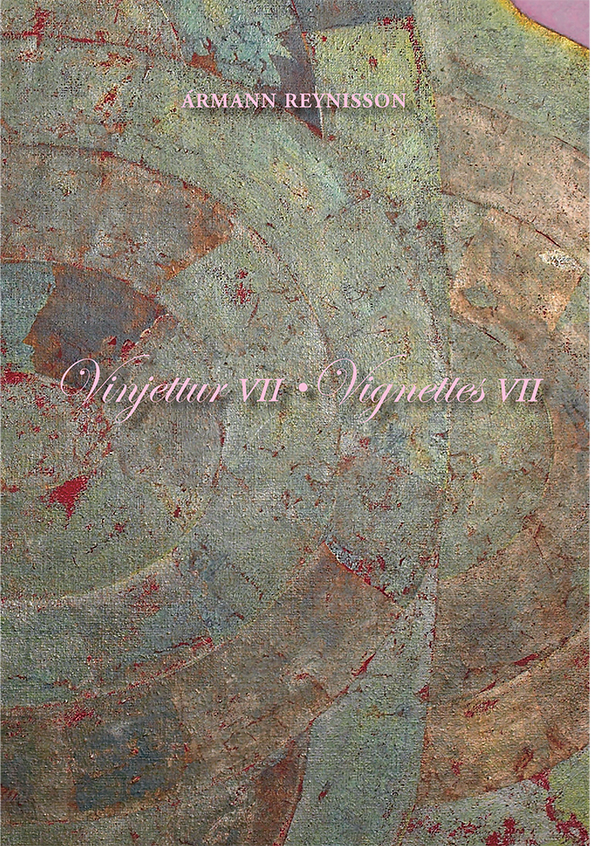Vignettes XXI
In Vignettes XXI, the author is inspired by a variety of subjects including current events, childhood memories, moving and illness. There are also portrait vignettes of interesting contemporary personalities who each make their mark on the country’s society. It is common for travellers to journey on the country’s highway through Húnavatnssýsla but they tend to allow the many interesting places and people who live and work there pass them by. In one section of the book, Ármann Reynisson opens his readers’ eyes to this fascinating part of the country.
The author’s unique style is well utilised; he is concise but poetic, realistic and illuminating. The vignettes are ideal for reading aloud at many an occasion.
Chapters
The Women’s Strike
The chosen day arrives and is rung in with freedom-fighting songs on the radio, interviews with the leaders of the struggle and a variety of articles in the newspapers. A large part of the female population participates in the strike, though some male chauvinists try to prevent women from showing solidarity (though few succeed in doing so). Many public institutions and companies close for the day, either in part or all their operations. Housework falls on the shoulders of the husbands or sons of the house or it is not done at all. Most men find the debt of love and sex the hardest.
The decade following the huge banking crisis
One evening in March 2020, the house of cards collapses, almost overnight, due to the Corona virus pandemic. Air travel is almost shut down and tourists stop coming. Now the state must save those who had been reaping the rewards. The government dishes out money left, right and centre – often to those who are the best off. Who will end up paying for it?
New Year’s Day 2018
At the turn of the last year, the weather is calm and mild and never before has such a fireworks display been seen; many people celebrate royally until the small hours of the morning. When daylight arrives, at around ten o’clock, city-dwellers are taken aback because it looks as if the famous London fog has settled over the city. Neighbouring houses can barely see one another long into the day and the New Year’s sun is unable to shine through the pollution. People with underlying health conditions find it difficult to breathe. The citizens awaken to a bad dream.
The Celebration of Sovereignty
Instead of celebrating the common good of all Icelanders and reconciling the nation with a new constitution, which it has elected by a solid majority, at a significant juncture, the old ruts are being replaced. The future is hazy for the political classes
Víkur Cemetery
In the second decade of the century, tourism flourishes in the capital. Hotels begin popping up left, right and centre. The old Telecom’s building gets into the hands of investors who decide to turn it into a hotel involving much restructuring
and additional plans to extend. City Planning gives full permission to further disturb the cemetery of course, in complete contrast to the wishes of the national church and many of the city’s citizens. Newspaper articles are published in defense of Víkurgarður, injunctions are placed, honorary citizens gather to protest against the City Council and the mayor – it is futile against monetary power. The city authorities and city council have limited respect for the city’s roots. Few things are considered sacred anymore – the teaching of Christianity is no longer allowed in the city’s schools.
A singing miracle
After a five-year career, her path leads her to London where she embarks on ambitious music studies at the Guildhall School of Music and Drama. After her first year of study, Diddú has ear surgery, which goes wrong, with the hearing in her right ear working at only a quarter of its capacity and suffering complete deafness in the left. But with her keen ear for music unharmed, she continues her studies for a further four years. Diddú, who is both ambitious and stubborn, decides with great conviction to live with her severely impaired hearing so that she
does not have to stop singing. Instead, adversity has deepened her character and amplified her artistic career.
The scientist
After ten years living abroad, Sigmundur is offered the difficult job, at very short notice, to establish the chemistry department for study at BSc level at the University of Iceland. There he works as a teacher for thirty years, as well as doing a variety of research. For a period of six years, the professor is the rector of the Univerity of Iceland and in that extensive work, Sigmundur succeeds in leading the University of Iceland from a stuffy institution to a research university through charisma, interpersonal skills, organizational talents and, not least, foresight and ambition for the institution. In turn, encouraging closer collaboration between the University teachers.
The cantor in Hallgrímskirkja
Hallgrímskirkja rises above Skólavörðuholt, consecrated in 1986, it is majestic in its simplicity and can be seen from many parts of Reykjavík. The National Shrine is the city’s main landmark that attracts people from all over searching for spiritual nourishment. A large part of this development comes from the first cantor of the church, together with his wife, who have built up a vibrant and notable cultural and music scene. In addition, from the beginning of his career, he submitted a draft for the purchase of an organ. The Klais organ from Bonn (inaugurated in 1992) is chosen; one of the largest and most atmospheric in Europe.
Family Aid
The light at the end of the tunnel comes from aid organisations, which distribute food, credit notes and clothes to those who need it most. One of them is Family Aid, which Ásgerður J. Flosadóttir (1954) establishes at the beginning of the new century and she leads the organisation for years. The businesswoman lives for her work, has a strong sense of empathy and finds it very easy to put herself in the shoes of others. The organisation is funded by sales from “The Unbelievable Shop” selling gifts and making candles for outdoor use “A light of
love for you,” second-hand clothing, and, not least, from the diligent support of numerous companies and patrons and, to a lesser extent, the government. The initiative has lightened the burden and warmed the hearts of many in the nation who really need it.
A creative photographer
In the prime of his life, Ásgeir begins to feel numbness in his hands that develops into a variety of chronic pain all over his body. He is diagnosed with CPPS. There is no medicine to completely control the pain. The patient has chronic fatigue, has no energy and sleeps for long periods when he cannot take any more. Ásgeir manages to work on interesting photography projects in between.
Iceland’s Pop Star
One of the most popular events of the summer is the “Gay Pride” parade in downtown Reykjavík. For decades, Páll Óskar can be found on top of the most glamorous vehicle of the parade attracting enormous attention. The pop star stands gracefully upon an elevated stage on the roof of the vehicle wearing bright, tight, sparkling clothing and moving in a provocative way. Arms in the crowd can be seen swaying like the waves of the ocean in time with the titillating music. There are dancers surrounding the artist both seated and standing, swaying gently to the music. In his role at the parade, as well as through his lyrics and interviews, Páll Óskar has brought attention to the struggle for gay rights.
Heggstaðanes
A half-collapsed, two-story wooden house comes into view. Close by, there is another dilapidated outbuilding with a barn attached. Further away, there is a concrete residence, the paint from which has washed off over time. After knocking, nobody comes to the door for some time. A gander is taken around the farmyard and once standing a little way from the house, there comes a voice: “Who’s there?” The guest turns around and sees the farmer, Davíð, hunched over in his working clothes carrying a bucket, one of the reclusive brothers on the farm. The newcomer introduces himself and manages to prize some information out of Davíð about the farm who has no time to lose. Davíð says: “Talk to my older and wiser brother, Hannes, who’s at home.” The doors open slowly and Hannes peaks out between the door and the doorframe – he is inexpressive, grey and haggard looking. Davíð says: “Do you want to educate our visitor about the peninsula?” Hannes replies coldly: “I have no interest in doing so.”
The Christmas Blues
The man has gallows humor and it is very much connected to Christmas celebrations and the message associated with it. He swears and curses in the most inappropriate circumstances. He enjoys damaging Christmas decorations and breaking Christmas lights. Occasionally, Jón will drink and has terrible outbursts about this and that. People around him do not understand why this otherwise attentive and prudent man becomes a different person around this time of year.For the longest time, Jón does not understand it either as he has difficulty opening
up and expressing his feelings. Many advise him to talk about his problems to a psychiatrist or a priest but he categorically refuses.
The amateur
At the end of the project, when the client plans to pay Láki the agreed hourly wage, the coffee breaks are not included. Láki becomes enraged and lets his acquaintance hear what he thinks, shouting in agitation: “I did not ask for your lousy refreshments and you disturbed me from my work with a load of bullshit.” His acquaintance is alarmed and asks Láki: “Are you going to take the wodge of cash or not?”
Blind motherly love
In old age, Silla dies having never faced reality – motherly love is blind. Nobody is allowed to attend his mother’s cremation except for Rúnar himself. The urn is forgotten in the storage rooms of Reykjavík Cemeteries.
The giant load of washing
It becomes second nature for the neat man to wash, iron and fold and gently straighten his washing. It takes him back to happy childhood memories when he would accompany his mother to the laundry room. Occasionally he was asked to help, mainly to straighten and fold.
Losing your footing
After decades of training, it comes as a surprise to Örn when he loses his footing whilst getting out of bed – the left foot. It is useless to try to walk so instead, he plods with great difficulty around his home. With great effort and
pain, Örn manages to brush his teeth and shave himself, take a shower and cook a light meal.
Christmas Eve 1960
Evening prayer begins at 18:00 sharp after the ringing of the church bells – Christmas has begun. It is like being in another world. A festive atmosphere descends upon the Christmas mass; two priests preside over the service and the music, the organ accompanied by a choir, is heavenly. As the postlude plays, the attendees wish each other a Merry Christmas.



